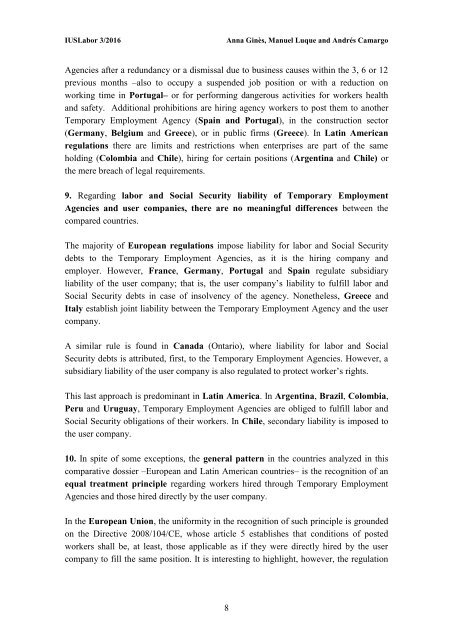wd9Hrt
wd9Hrt
wd9Hrt
Create successful ePaper yourself
Turn your PDF publications into a flip-book with our unique Google optimized e-Paper software.
IUSLabor 3/2016<br />
Anna Ginès, Manuel Luque and Andrés Camargo<br />
Agencies after a redundancy or a dismissal due to business causes within the 3, 6 or 12<br />
previous months –also to occupy a suspended job position or with a reduction on<br />
working time in Portugal– or for performing dangerous activities for workers health<br />
and safety. Additional prohibitions are hiring agency workers to post them to another<br />
Temporary Employment Agency (Spain and Portugal), in the construction sector<br />
(Germany, Belgium and Greece), or in public firms (Greece). In Latin American<br />
regulations there are limits and restrictions when enterprises are part of the same<br />
holding (Colombia and Chile), hiring for certain positions (Argentina and Chile) or<br />
the mere breach of legal requirements.<br />
9. Regarding labor and Social Security liability of Temporary Employment<br />
Agencies and user companies, there are no meaningful differences between the<br />
compared countries.<br />
The majority of European regulations impose liability for labor and Social Security<br />
debts to the Temporary Employment Agencies, as it is the hiring company and<br />
employer. However, France, Germany, Portugal and Spain regulate subsidiary<br />
liability of the user company; that is, the user company’s liability to fulfill labor and<br />
Social Security debts in case of insolvency of the agency. Nonetheless, Greece and<br />
Italy establish joint liability between the Temporary Employment Agency and the user<br />
company.<br />
A similar rule is found in Canada (Ontario), where liability for labor and Social<br />
Security debts is attributed, first, to the Temporary Employment Agencies. However, a<br />
subsidiary liability of the user company is also regulated to protect worker’s rights.<br />
This last approach is predominant in Latin America. In Argentina, Brazil, Colombia,<br />
Peru and Uruguay, Temporary Employment Agencies are obliged to fulfill labor and<br />
Social Security obligations of their workers. In Chile, secondary liability is imposed to<br />
the user company.<br />
10. In spite of some exceptions, the general pattern in the countries analyzed in this<br />
comparative dossier –European and Latin American countries– is the recognition of an<br />
equal treatment principle regarding workers hired through Temporary Employment<br />
Agencies and those hired directly by the user company.<br />
In the European Union, the uniformity in the recognition of such principle is grounded<br />
on the Directive 2008/104/CE, whose article 5 establishes that conditions of posted<br />
workers shall be, at least, those applicable as if they were directly hired by the user<br />
company to fill the same position. It is interesting to highlight, however, the regulation<br />
8


